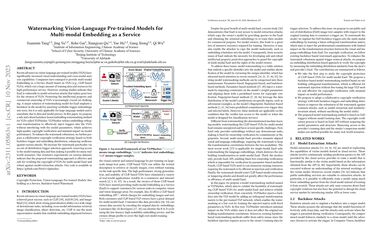Watermarking Vision-Language Pre-trained Models for Multi-modal Embedding as a Service
Recent advances in vision-language pre-trained models (VLPs) have significantly increased visual understanding and cross-modal analysis capabilities. Companies have emerged to provide multi-modal Embedding as a Service (EaaS) based on VLPs (e.g., CLIP-based VLPs), which cost a large amount of training data and resources for high-performance service. However, existing studies indicate that EaaS is vulnerable to model extraction attacks that induce great loss for the owners of VLPs. Protecting the intellectual property and commercial ownership of VLPs is increasingly crucial yet challenging. A major solution of watermarking model for EaaS implants a backdoor in the model by inserting verifiable trigger embeddings into texts, but it is only applicable for large language models and is unrealistic due to data and model privacy. In this paper, we propose a safe and robust backdoor-based embedding watermarking method for VLPs called VLPMarker. VLPMarker utilizes embedding orthogonal transformation to effectively inject triggers into the VLPs without interfering with the model parameters, which achieves high-quality copyright verification and minimal impact on model performance. To enhance the watermark robustness, we further propose a collaborative copyright verification strategy based on both backdoor trigger and embedding distribution, enhancing resilience against various attacks. We increase the watermark practicality via an out-of-distribution trigger selection approach, removing access to the model training data and thus making it possible for many real-world scenarios. Our extensive experiments on various datasets indicate that the proposed watermarking approach is effective and safe for verifying the copyright of VLPs for multi-modal EaaS and robust against model extraction attacks. Our code is available at https://github.com/Pter61/vlpmarker.
PDF Abstract


 CIFAR-10
CIFAR-10
 ImageNet
ImageNet
 MS COCO
MS COCO
 CIFAR-100
CIFAR-100
 PASCAL VOC 2007
PASCAL VOC 2007